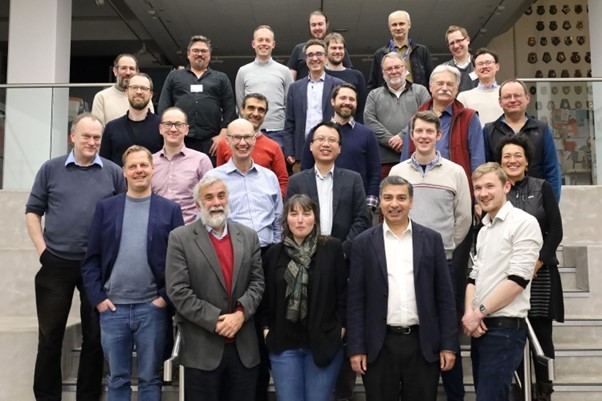The
UK XFEL project is a visionary effort to give UK researchers access to next-generation X-ray Free Electron Laser (XFEL) capabilities.
 Speakers and organisers of the UK XFEL town hall at the Univeristy of PlymouthThe project is being managed by myself and is a cross-departmental effort between the STFC Technology Department, ASTeC, and
the Central Laser Facility. Just as important however is our engagement with future users and operators of such a facility. As such we also have a dedicated science team of over 50 academics, headed up by Jon Marangos of Imperial College. As part of our engagement plan with the science and industrial communities, we’ve been hosting various town halls across the UK to grow the FEL community, gauge appetite for our design ideas, and hear more about novel FEL experiments already taking place at existing facilities.
Speakers and organisers of the UK XFEL town hall at the Univeristy of PlymouthThe project is being managed by myself and is a cross-departmental effort between the STFC Technology Department, ASTeC, and
the Central Laser Facility. Just as important however is our engagement with future users and operators of such a facility. As such we also have a dedicated science team of over 50 academics, headed up by Jon Marangos of Imperial College. As part of our engagement plan with the science and industrial communities, we’ve been hosting various town halls across the UK to grow the FEL community, gauge appetite for our design ideas, and hear more about novel FEL experiments already taking place at existing facilities.
So, at 5 am on Wednesday the 17th of January, I set off to the University of Plymouth to run our latest event focusing on Fundamental Physics, AI and Quantum. I was joined on this intrepid journey by other members of the design team: Dave Dunning, Alan Mak, PhD, Storm Mathisen, and Jim Clarke, who, I’m sure, were just as happy about the early start as I was. Each of our events has a science theme which helps provide structure to the talk. Our first two meetings were themed
'Frontiers of Measurement' and 'Materials, Chemistry and Biology at Extreme Conditions', hosted by Queen's University Belfast and the University of Strathclyde respectively. To date, each town hall meeting has been a two-day event, starting with an opening talk aimed at giving an overview of the project, updates on the facility design and a review of XFEL science, before moving on to the stated science and technology theme.
After the inevitable delayed trains and understocked drinks carts, we arrived in Plymouth to meet with the local organising team at the brand-new Babbage building, named in honour of Charles Babbage for his transformative breakthroughs in computing – very fitting, given the event themes. As at both previous town halls, there was a vibrant set of talks and discussions, with numerous ideas to utilise the proposed features of a next-generation XFEL, how the fundamental physics community need to engage early to help shape the design, and potential novel acceleration techniques which could be deployed at a FEL. Discussions around the data requirements of such a facility and how it can be impacted by the AI/machine learning community were also highlighted during the sessions. The first day was closed by our keynote speaker, Professor Sir Peter Knight who delivered an insightful talk explaining how the UK has recently developed a long-term national strategy for quantum technology.
The second day started, as every day should, with a very fresh run around the harbour (obligatory Strava link). We’d purposely scheduled fewer speakers on the second day allowing plenty of time for discussions and audience participation. This meant that everyone got to provide input into the design and specifications that the team presented and feedback on the science covered over the two days. The discussions didn’t get too heated, which was a shame as the heating in the building was suffering from new build niggles and the sub-zero sea air was seeping in through the fire escapes. But despite this, the town hall was a hugely successful event (thank you to Shakil, Tom, Ben, James, and Mara at the University of Plymouth), and so we started our de-brief on the journey back up north with a stand-up meeting courtesy of Avanti Rail. There was much to discuss and plenty to bring back to feed into both the refreshed science case and the conceptual design study.
A further four town hall events are planned for 2024, with the next being hosted by the Diamond Light Source at the Rutherford Appleton Laboratory in Oxfordshire, with a focus on 'Life Sciences'. The project team encourages everyone interested to join either in person or online – details will be released via the
project website and
mailing list.
Led by the Science and Technology Facilities Council, the UK XFEL project is now a year into a three-year Conceptual Design and Options Analysis, supported by the UK Research and Innovation Infrastructure Fund. By the end of 2025, the project team will have evaluated the conceptual design of a new facility based in the UK, as well as assessing alternative options for UK users gaining access to next-generation XFEL capabilities by investing in existing international facilities – exciting!
Interested in learning about the UK XFEL project? Visit
our website for more information or contact Paul Aden at
ukxfel@stfc.ac.uk.
Written by Paul Aden.
